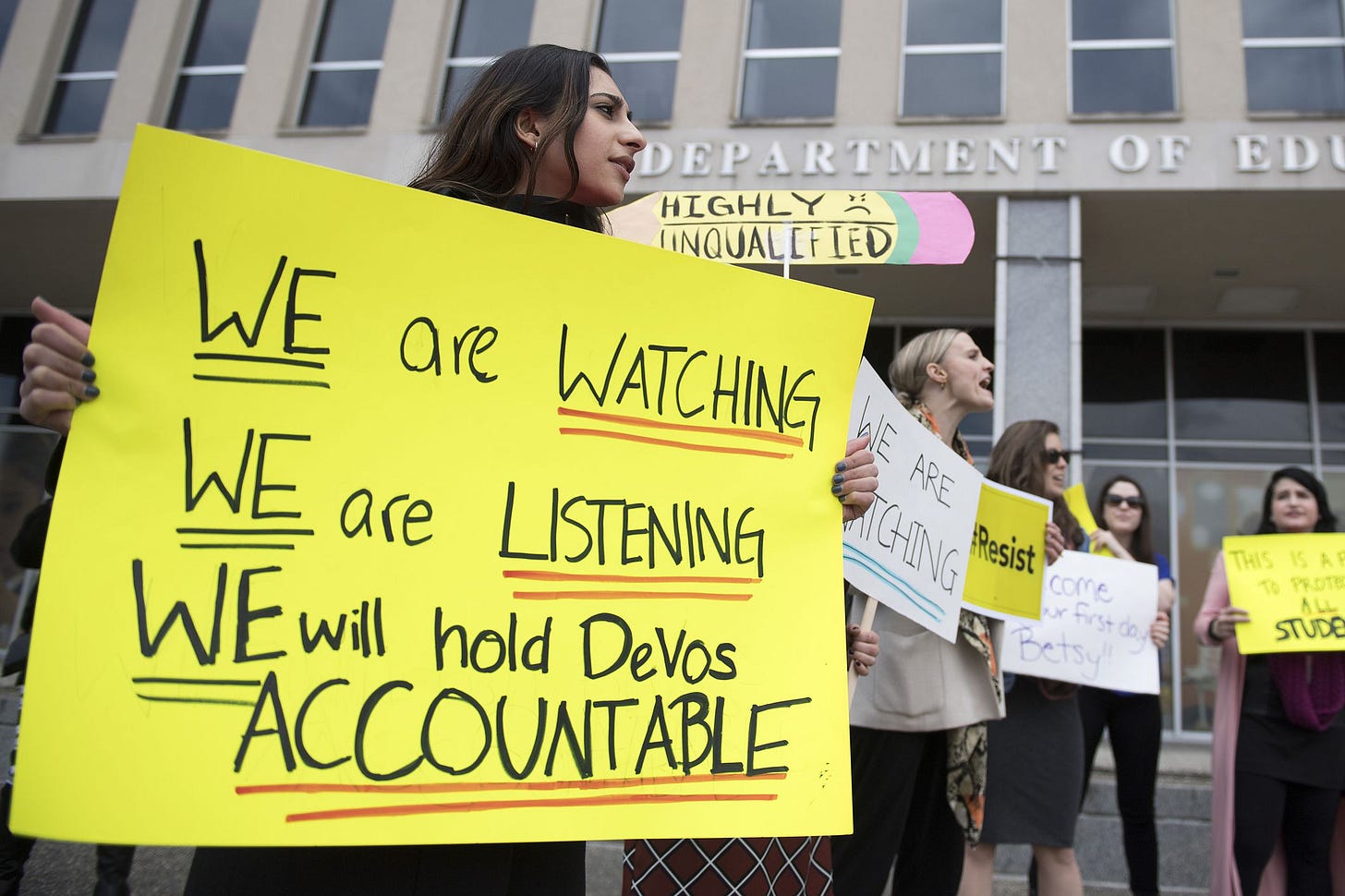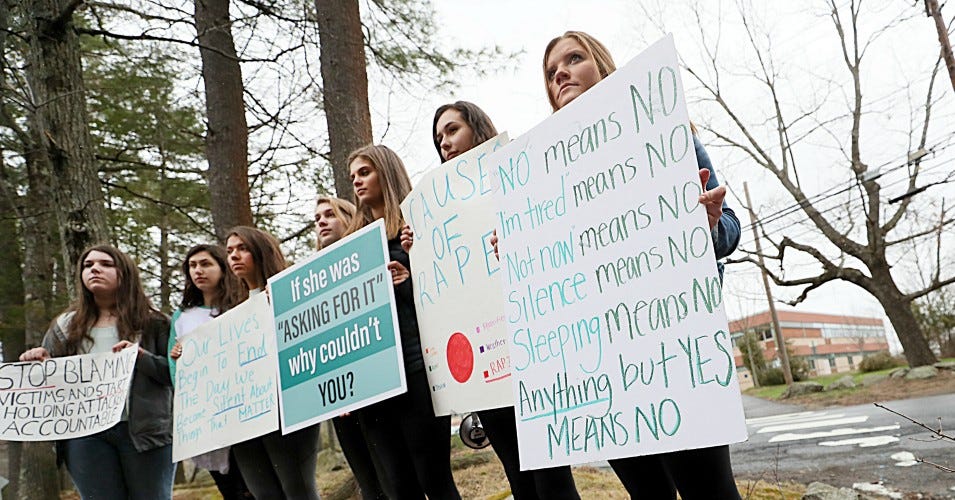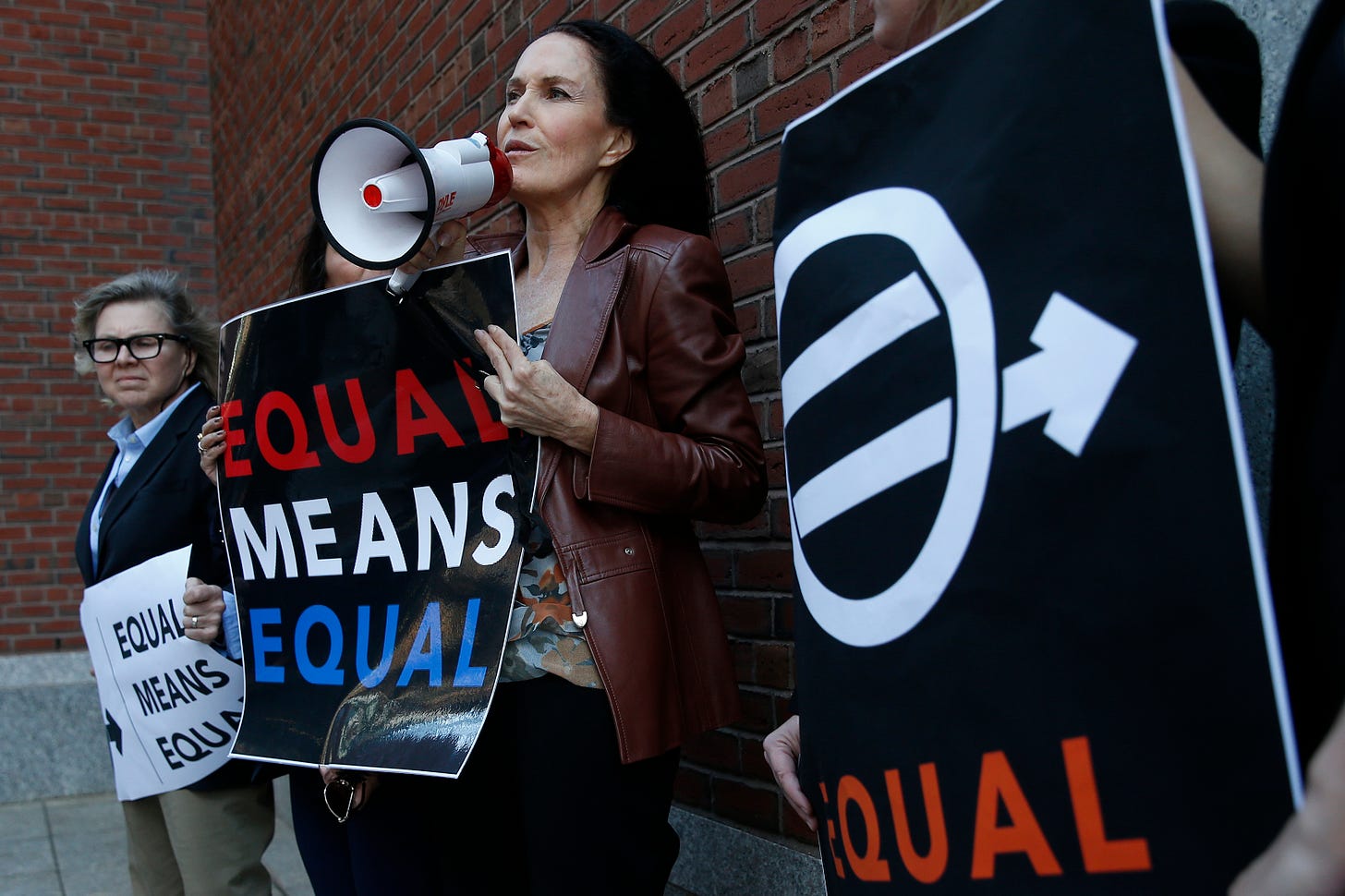
(Secretary of Education Betsy DeVos listens as Trump speaks during a briefing on the coronavirus pandemic in the press briefing room of the White House on March 26, 2020 in Washington, D.C. Photo by Drew Angerer, via Getty Images.)
Education Secretary Betsy DeVos has just revealed a finalized version of her plan to issue sweeping changes to Title IX, the federal gender-equity law, that will take effect on August 14th of this year. The new regulation is mostly unchanged from the proposed version released in 2018, and is comprised of 2,000 pages, that ultimately bolster protections for students and employees accused of sexual misconduct within the educational system.
These new rules overhaul Obama Era regulations from 2011 and 2014 that created a broader definition for sexual harassment and held schools liable for sexual incidents they knew about or “reasonably should” have known about. The standard adopted by the Obama administration for investigating these cases on campuses was a “preponderance of evidence.” Cross-examination and mediation between victims and accused students was discouraged. Betsy DeVos has now completely done away with these victim protections and the new standard of review is “clear and convincing,” a burden that is substantially harder to justify.
“…the issue is that given the serious disruptions caused by the COVID-19 pandemic, institutions simply do not have the capacity to implement these proposals at this time. Implementation of the Title IX regulations is expected to be enormously complex and burdensome for campuses, and will require a coordinated effort across multiple campus departments and constituencies to identify, review, and change existing policies and procedures in a considered and sensible manner. At a time when institutional resources already are stretched thin, colleges and universities should not be asked to divert precious resources away from more critical efforts in order to implement regulations unrelated to this extraordinary crisis. We respectfully ask you to immediately pause these two regulatory efforts…” — The American Council on Education in a March letter to Education Secretary Betsy DeVos, urging her to wait on the release of the new rules
The previous patterns of cover-ups and frequent missteps in Title IX proceedings across all levels of the educational system was what the Obama administration was attempting to correct through the old plan, in an effort to expand Title IX equal protections to more than just sports and provide accountability. Now, these new regulations cultivated by DeVos will be subject to public comment and unlike the less formal guidance issued by the Obama administration, once finalized, these new rules will carry the force of law.
Colleges and universities will now be required to hold live hearings, during which cross-examination of the victims will be allowed. These new regulations also drastically narrow the scope and definition of what constitutes sexual harassment, which means that investigations will not be required for all complaints.

(Protesters outside the Department of Education as Secretary Betsy DeVos prepares to deliver remarks on February 8, 2017 in Washington, D.C. Photo by Jim Watson of AFP, via Getty Images.)
Title IX will now only apply to a version of sexual harassment that meets the limited definition established by the Supreme Court that defines it as “unwelcome conduct that is so severe, pervasive and objectively offensive that it effectively denies a person access to the school’s education program or activity,” adding that such conduct constitutes harassment if “a reasonable person” says it does. The rules still require that schools dismiss complaints that do not meet the strict sexual harassment definition, even if the allegations are proven true.
Anyone who has experienced systematic sexual harassment can attest that the abuse rarely takes such a direct form. It is this difficulty in proving one’s case that cause most victims of sexual harassment decline to come forward. Discouraging victims perpetuates a cycle of abuse that is allowed to go unchecked — a cycle that inevitably claims more victims within a power system that already favors the abuser. This was the pattern the Obama administration sought to destroy, that within two years, DeVos has firmly re-established with the full power of the law.
“[Victims] refuse to go back to the days when rape and harassment in schools were ignored and swept under the rug. Betsy DeVos and the Trump administration are dead set on making schools more dangerous for everyone — even during a global pandemic and if this rule goes into effect, survivors will be denied their civil rights and will get the message loud and clear that there is no point in reporting assault.” — Fatima Goss Graves, National Women’s Law Center President
Under the new rules, college students accused of sexual assault and harassment will now be given the right to a live hearing as well as the ability to cross-examine their accusers, which in these cases will be the alleged victims. Anyone who has worked in the arena of sex crimes knows what a terrible idea this is for victims, who often suffer more trauma during the process and as a result are discouraged from reporting their assaults. The new regulations also create courtrooms on campuses and puts the entire process squarely on the shoulders of the universities and colleges who are forced to oversee all complaints that are deemed worthy.
The new rules include protections that many are calling unbalanced in favor of the accused at the expense of protecting victim’s rights. The process now requires that accused students must be given written assurance that they are presumed innocent. Schools are not allowed to impose any form of disciplinary action against an accused student until the case has fully concluded. Schools are permitted to remove students from campus who are found to pose a risk, but the likelihood of this standard being put into effect is substantially lessened by the new protections afforded to those accused of misconduct.
The new Title IX rules include several notable provisions such as the provision that universities are responsible for investigating incidents that are a part of a university program that take place in on campus university housing such as a fraternity or sorority house, as well as off-campus housing like apartments. The regulations now explicitly add domestic violence, dating violence and stalking as allegations that are mandated to be investigated, provided they rise to the definition of what constitutes harassment.

(Students hold signs as they take part in a walkout at Lincoln-Sudbury Regional High School in Sudbury, Massachusetts on April 30, 2018 in response to the school's handling of a sexual assault case. Photo bySuzanne Kreiter of The Boston Globe via Getty Images.)
The law dictates that K-12 schools are to be considered “on notice” of allegations if any school employee has been informed of the allegations, meaning an investigation is required. However, schools are no longer required to designate most employees as “mandatory reporters,” which means that there is no mandatory requirement for all faculty and staff to report to the Title IX office when they hear about potential allegations.
Colleges are now forbidden from using a single-investigator model, which was a common way that a report and findings were previously established in the past and this model did not ensure that a hearing always took place. Institutions are now able to hold Title IX hearings via videoconference at their discretion. Given that campuses are operating mostly online, many administrators have considered delaying hearings until after the pandemic is over altogether.
The new rules also bolster the role and visibility of the Title IX coordinator, who will now act as the main point person for facilitating the complaint process. Schools will be allowed to appoint several staff members to the position and those staff members are now required to provide “supportive measures” to accusers even if they choose not to go through with a formal complaint. However, whether schools decide to place truly qualified and caring individuals in these positions, professionals who are intent on preserving victims rights and making sure the process is fair in these, is another issue. This new power given to Title IX administrators does not have the prerequisite oversight that is truly needed to ensure all sides are protected.
A provision has been added to combat retaliation against accusers who bring sexual assault complaints, such as the school being forbidden from punishing a student or other complainant for making a claim. Given the high instance of retaliation known to occur in these situations, nothing has been specifically done to make sure that more subtle incidents of retaliation will be expressly prohibited. There has been no specific clause that accounts for punishment of retaliation at any level under any circumstance.
Although this Title IX overhaul was a long time coming and expected by those who oppose these new regulations, the priority to institute them now is considered a big win for Trump and his administration. These new rules were established just in time for the Trump administration to avoid the Congressional Review Act, which would have allowed Congress to scrutinize and roll back any recently issued rules it found abhorrent. President Trump has personally commended Ms. DeVos for the job she has done in her efforts to “reform” the Title IX system.
What is certain is that critics of the Trump and DeVos agenda will not stop contesting these one-sided regulations. Victim’s rights advocates have already successfully challenged many of policies from the Department of Education in court by attacking DeVos’ lack of adherence to federal rules while issuing these new regulations.

(Attorney Wendy Murphy, center, speaks through a bullhorn as she and a small group of other women protest the Trump administration's rollback of sexual assault rules in Title IX outside of Moakley Federal Courthouse in Boston on Oct. 19, 2017, where activists filed suit against Betsy DeVos and the Department of Education for the change. Photo by Jessica Rinaldi of The Boston Globe via Getty Images.)
The rules can be overturned by a simple majority of the Senate, but that will be impossible without Democrats taking a majority of seats in the upcoming November elections. Are you preparing to send one of your children off to college any time soon? Do you have a child or grandchild at a university now? Do you have a child in the K-12 educational system? This should be all of us, at the very least we should all be concerned for the physical safety of every child in the United States.
Trump and Betsy DeVos have just made sure to reinforce the protections given to those accused of sexual assault, which are predominantly men. What is most offensive is that they used a Title IX law that seeks to extend equal opportunity and protections to women and girls to do it. If the school year begins in August, students will be abiding by these new regulations for months at a minimum before November, which means all students will be at risk for sexual abuse beginning this fall with less protections in place to stop it. VOTE.
Your paid subscriptions allow me to keep publishing critical and informative work that is often made available to the public. If you like this piece and you want to support independent journalism from a female perspective, you can forward this article to others or send a gift a subscription to someone else today.
Amee Vanderpool writes the SHERO Newsletter and is an attorney who contributes to magazines, newspapers and radio. She can be reached at avanderpool@gmail.com or follow her on Twitter @girlsreallyrule.




And yet there are some women who continue to support her and her Orange Asscactus boss. I don't get it. What am I missing????????????
@$%#*++¥£#*,!@&”:: Debos